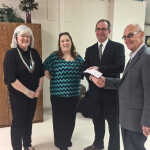MCFF grant funds dementia technology program

McCOOK, Neb. -- Sometimes an idea is right there in front of you or - more precisely - right there on your wrist. Hillcrest Nursing Home in McCook has developed a new enhanced Alzheimer's care program which involves the use of a Fitbit, the fitness bracelet that can track activity, exercise, food, weight and sleep.
The idea to use a Fitbit with Hillcrest's Alzheimer's patients developed when Hillcrest staff borrowed Hillcrest administrator Collinda Nappa's personal Fitbit to help monitor resident's vital statistics.
"We couldn't get a good heart-rate reading from our Hillcrest residents with Alzheimer's," said Hillcrest Foundation director Maggie Repass, so staff borrowed Nappa's Fitbit to monitor the resident.
And now thanks to a donation from the McCook Community Foundation Fund, the Hillcrest Foundation will be able to develop and expand the use of Fitbits for use with Alzheimer and dementia patients at Hillcrest. Funding from the grant will also help Hillcrest staff receive continuing dementia/Alzheimer's education monthly, as well as expand education in the community about Alzheimer's and dementia.
The donation to the Hillcrest Foundation was one of six grants distributed by the McCook Community Foundation Fund during the fall 2015 cycle. Other grants this past year included the McCook Toy Box, the leadership program grant to the McCook Community College, a grant to the City of McCook toward the completion of McCook's skate park, and to the McCook Public Schools toward the advance biology field trip and for the Steve Seskin anti-bullying and song-writing program.
The spring 2016 grant deadline is approaching, with grant applications due by Friday, April 1.
Personal connection
The Alzheimer's care program at Hillcrest stems from a personal connection by Nappa, who has a Master's in dementia care and received Certified Dementia Care Practitioner accreditation in 2013 from the National Association of Dementia Care Practitioners.
"I have always enjoyed caring for those who are unwilling or unable to care for themselves," Nappa explained. "My husband's grandmother recently passed away and she had Alzheimer's. I helped care for her in her home so she didn't need to go to the nursing home."
The connection to Alzheimer's and dementia hits even closer to home for Nappa.
"My father has sedation dementia. He underwent numerous surgeries in a row and has never quite recovered from them," she said.
Nappa began using the Fitbit because is a lousy sleeper and it was a simple way to monitor her sleep patterns. "I look at it every day to see how I actually slept the night before," Nappa said. "Then I look at what I did the previous day to see if I can change things so I am able to sleep better."
This led to the idea about using Fitbits with Hillcrest patients, which is being developed with the help from Fitbit which may partner with Hillcrest on the project.
"We spend too much time trying to get dementia residents to conform to our schedule: sleep at night and awake during the day," Nappa said. "We need to learn about them and their natural routine or former routine before we can help them attain the best quality of life."
Since the Alzheimer residents sometime have a difficult time communicating, Hillcrest staff can struggle to convey that they are simply taking vital stats and need the resident to stay still, Repass said. With the Fitbit, the resident's vital stats are continuously monitored. This provides short-term information and a way for staff to monitor agitation levels, which in turn will provide a more stress-free, engaging environment.
"We can look at the computer and see that the resident is doing fine without waking them," Repass said. "And we can learn what triggers certain behaviors such as voices in the unit."
But the information gained from the new technology will also hopefully provide long-term feedback.
"We can also use that information to figure out a good time to schedule their activities, based on the information," Repass said. "Staff will be able to track and determine patterns to discern when a resident may be most responsive to therapy."
Other goals of dementia program
Another use of the MCFF grant will be to conduct extensive training with all the Hillcrest staff regarding dementia, as well as hospital staff and others in the medical field.
"The bottom line is we have to know the people we are caring about. We have to stop using words like 'remember' as that only hinders the situation and living in the moment with the resident instead of 'reminding' them of where they actually are," Nappa said. "There is no need to cause additional emotional issues."
And the third phase of the dementia care program will be taking the information they learn from the program to the public. "We hope to educate the community through support groups, including an established monthly Alzheimer's support group, and the distribution of Alzheimer's and dementia literature," Repass said. "We will help families understand the dementia and Alzheimer's process and its' progression."
For more information about the McCook Community Foundation Fund or the 2016 spring grants, contact MCFF at (308) 344-9363 or mcffund@gmail.com. McCook Community Foundation Fund is an affiliated fund of the Nebraska Community Foundation. NCF is a 501(c)3 nonprofit organization established in 1993 to provide strategic planning, education, training and financial management to affiliated funds across Nebraska.
